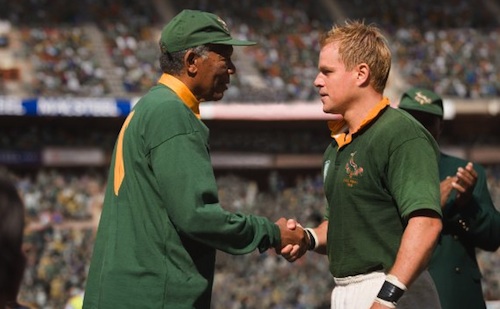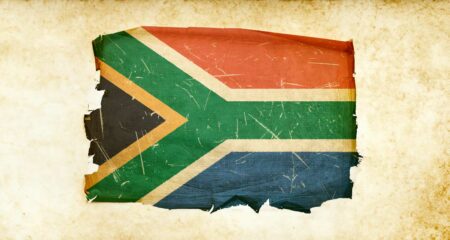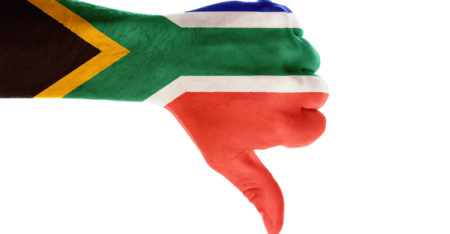Clint Eastwood has created a career out of American myths — making them flesh in his acting career in roles like the Man with No Name and Dirty Harry, and, later taking them apart as the director of films such as Unforgiven and Flags of Our Fathers. Rooted as he is in Americana, Eastwood seems an unlikely director for Invictus, starring Morgan Freeman as Nelson Mandela and Matt Damon as Francois Pienaar. It’s a film that tries to wrap its arms around a South African living legend and a mythic moment in the country’s history.
But the film is universal in its outlines, even if it is South African in its colouring. Boiled down to its essence, the story could be about a coach and a principal in an American ghetto high school turning an underdog football team into champions. The film is only partially a success, though it will make nearly any South African who remembers the day dewy-eyed and nostalgic.
Invictus is based on Playing the Enemy: Nelson Mandela & the Game that Made a Nation, an insightful political history by British journalist, John Carlin. Carlin’s book spans many of the key figures and years in the transition to democracy, culminating in SA’s Rugby World Cup victory in 1995. Eastwood focuses more closely on Nelson Mandela, Francois Pienaar, and their preparations for the World Cup.
The image of Mandela, clad in his Springbok jersey, shaking hands with Pienaar at the end of the hard-fought 1995 World Cup final probably carries as much emotional weight for many South Africans as the USMC War Memorial does for Americans. While Eastwood’s Flags of Our Fathers is a penetrating look at the reality behind the iconic photo, Raising the Flag on Iwo Jima, and the memorial it inspired, Invictus turns a softer gaze on SA history.
As one expects from Eastwood, it’s an elegant, well-made film with impeccable period and local detail. From PJ Powers belting out a song at the World Cup final, through to the old SA Airways regalia, Eastwood has taken great care to get the small things right in his film. To my (inexpert) eye, the rugby scenes seemed convincingly bone-crunching.
Freeman — who brings an air of benign authority, gentle good humour and ageless wisdom to nearly every role he plays — was probably Eastwood’s best choice among bankable Hollywood stars to play Madiba. Most of the time he nails Mandela’s accent and mannerisms, and he has a close enough physical resemblance to the former president to pull off the role.
I was initially sceptical about Damon as Pienaar, but he acquits himself reasonably well as the stoic and apolitical Springbok captain who steps up when history calls on him.
Though some critics have grumbled that the film doesn’t really let the viewer get to know Mandela and Pienaar, I don’t see that as a great weakness, at least for SA viewers. We know the men and what they represent — digging too deeply into their personal lives would detract from the history they set in motion.
While the lead roles are taken by Americans, most of the supporting cast are South Africans — between this and District 9, international audiences must be quickly getting used to SA accents. Sadly, political and sporting figures that loom large in Carlin’s book are sidelined here, even the likes of Joel Stransky and James Small.
Though I enjoyed Invictus, it isn’t an Eastwood masterpiece in the class of Letters from Iwo Jima, Mystic River or Unforgiven. There are moments where the empathy and humanism that characterise many of his best films as director congeal into the sticky sentimentality that blemishes the worst of them.
Some scenes — like an impromptu visit with the rugby team by Mandela scored to a sickly sweet song by boyband Overtone — are cringe-worthy in their own right. I can’t imagine Mandela or Pienaar saying some of the soundbites and homilies that tumble from the mouths of Freeman and Damon.
But a bigger problem lies with the way that Eastwood has airbrushed nearly any controversial fact or inconvenient event out of his film. Judging from Invictus, you’d think that the Springboks strode purposefully towards the final just as soon as they got a dose of Madiba magic. The film doesn’t really show how just touch-and-go SA sport and politics were at that tumultuous time.
Moments, like the near-try in the semi-final that France insisted was actually a try and the All-Blacks’ sour grapes accusation that they were poisoned ahead of the final are excised from the history. (The latter controversy is also omitted from Carlin’s book). The historical context that Carlin sets out so masterfully is also mostly chopped away. Far from detracting from SA’s triumph, portraying the difficult times would have made it seem sweeter.
Many American critics have scoffed in disbelief at the scenes of burly Afrikaans rugby players coaching township kids in the game, and of Mandela’s own black bodyguards gradually learning to share an interest in rugby with the Special Branch operatives he took over from FW De Klerk. If Eastwood had shown some of the harsher realities, if he’d showed how reconciliation started slowly and painfully ahead of the World Cup, those scenes would’ve had far more impact.
The film is as fake — or as authentic — as a Castle beer ad from the mid-90s and you know that you’re being manipulated every step of the way. But as a South African, who remembers the wild elation of the World Cup victory, it’s hard to not to go with the flow. — Lance Harris, TechCentral





